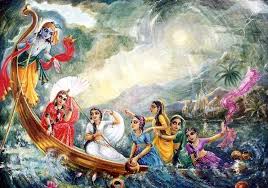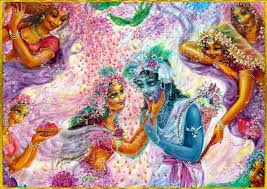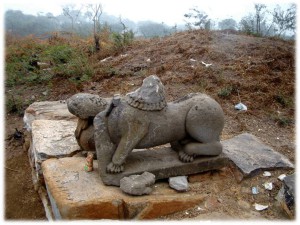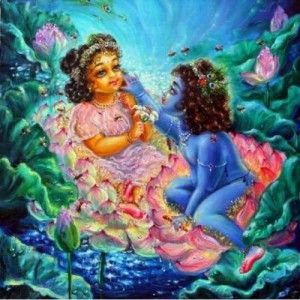The Disguise of the Boatman
Śrīla Jīva Goswami narrates a beautiful and playful pastime that took place at Manasi Ganga, a sacred lake in Vrindavan. One evening, Śrīmatī Rādhārani and the Gopis were carrying pots filled with sweets, yogurt, and butter. The Manasi Ganga at that time was quite large, spanning about 8 miles, and nightfall was approaching. They needed to cross the lake to return home, but they had no boat to make the journey.
At that moment, Krishna appeared in the disguise of a simple boatman. The Gopis called out to him, “Boatman, Boatman, please take us across!” The boatman replied, “You must pay me for my service. You have milk products and sweets.” After some playful negotiations, they reached an agreement, and Krishna, as the boatman, began to eat many of the sweets and drink the milk provided by the Gopis. Satisfied, he allowed them to board the boat, and he began rowing.
The Boatman’s Playful Demands
As the boat moved through the water, Krishna suddenly stopped rowing. The Gopis asked, “Why have you stopped?” Krishna, feigning hunger, said, “I need more food to keep going. Give me more yogurt and butter.” The Gopis reluctantly fed him more of their provisions. After eating to his heart’s content, Krishna laid down in the boat, saying, “I have overeaten, and now I need to rest. My arms are too tired to row anymore.”
The Gopis, growing impatient, warned him, “If you don’t start rowing, we’ll throw you into the water!” Hearing this, Krishna resumed rowing but soon stopped again. This time, he claimed that the boat was too heavy and was at risk of sinking. To lighten the load, he instructed the Gopis to throw their milk pots into the lake. They complied, tossing all their precious milk products into Manasi Ganga.
But Krishna wasn’t done. He then told them that the boat was still too heavy and that they would have to throw their jewelry into the water as well. The Gopis, though reluctant, removed their jewelry and cast it into the lake. Yet Krishna insisted that the boat remained too heavy, hinting that they would need to throw their clothes into the water next. The Gopis, frustrated, threatened to throw him into the lake instead.
The Revelation of the Boatman’s True Identity
Krishna resumed rowing, but soon, the boat stopped again. This time, by Krishna’s will, dark clouds formed in the sky, and the lake’s waves became rough, making the boat rock dangerously. The Gopis, frightened by the sudden storm, clung to each other for safety. Śrīmatī Rādhārani, desperate to save herself and her friends, held onto the boatman and pleaded, “Please save us, Boatman, please save us!”
As soon as she touched him, Rādhārani realized that this was no ordinary boatman—it was Krishna Himself! A joyful smile spread across her face as the clouds disappeared and the storm subsided. The Gopis, confused by Rādhārani’s sudden change in demeanor, asked her what had happened. In response, she pulled out Krishna’s flute from his belt and showed it to them, revealing the true identity of the mischievous boatman.
The rest of the night was filled with blissful nauka-lila (boat pastimes) as Krishna, Rādhārani, and the Gopis continued their playful interactions on the serene waters of Manasi Ganga.
Lessons to Be Learned from the Pastime
- Krishna’s Playfulness and Compassion:
- This pastime highlights Krishna’s playful nature and His deep connection with His devotees. Even in disguise, Krishna’s presence brings joy and love to those around Him. His playful demands, though seemingly mischievous, ultimately lead to greater happiness and divine interaction with the Gopis.
- The Joy of Devotion:
- The Gopis’ willingness to give up their material possessions (food, jewelry) for Krishna reflects their pure devotion. They are not attached to worldly things but are instead focused on their loving relationship with Krishna, which brings them true joy and fulfillment.
- The Revelation of the Divine:
- The moment Śrīmatī Rādhārani recognizes Krishna underlines the theme of divine revelation. Even in our daily lives, the divine may appear in unexpected forms, and recognition of this truth brings immense spiritual joy.
- The Unity of the Divine and the Devotee:
- The playful interaction between Krishna and the Gopis symbolizes the unity and intimate connection between the Divine and His devotees. This lila (pastime) teaches that the Divine is always near, even in moments of apparent distress, and that recognizing this connection leads to spiritual ecstasy.
Prayer for Devotion and Divine Play
O beloved Krishna, the eternal boatman of our hearts, We bow before You, seeking Your playful presence in our lives.
May we, like the Gopis, offer everything we have to You, Finding joy and fulfillment in our devotion to Your divine form.
O Lord, reveal Yourself to us in the midst of our daily struggles, So that we may recognize Your hand in all that we do.
May we embrace the play of life as You guide us across the waters of existence, And may our hearts remain forever united with You in love and devotion.
Hare Krishna, Hare Krishna, Krishna Krishna, Hare Hare, Hare Rama, Hare Rama, Rama Rama, Hare Hare.
Om Tat Sat.



